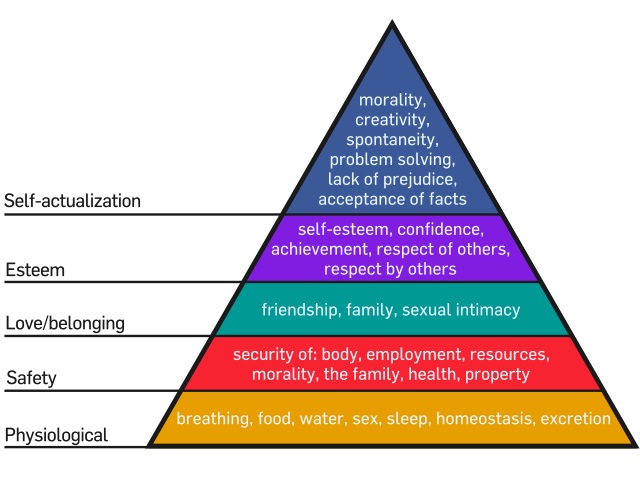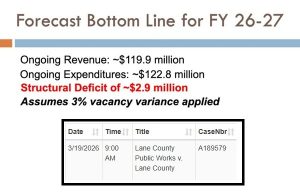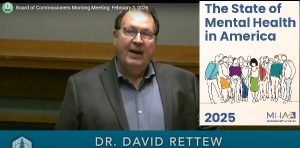City councilor hopes to set priorities for budget
5 min read
Presenter: A city councilor is calling for public workshops to discuss Eugene’s priority-based budget. In a phone interview Dec. 10, Councilor Randy Groves:
[00:00:09] Councilor Randy Groves: Nobody wants their favorite service to be reduced or even eliminated. But at some point, we have to start having these very real conversations. With the current structure of Oregon taxation, … our revenue growth is about 2.6% per year while inflation has been most of the time far higher than that. And so, you know, the pool of money shrinks while the costs to deliver the services increases.
[00:00:41] But at the same time, I think it would be a real healthy exercise for the leadership of the city to go through an exercise like this that really makes you think: What do we absolutely have to have to run?
[00:00:54] Presenter: Councilor Groves said he has a preferred method for setting priorities.
[00:00:58] Councilor Randy Groves: The question is, how do you prioritize? Well, I would like to see not just a work session, but a couple of half-day workshops where council sits down, obviously, in a public meeting format. But we talk amongst ourselves about how we approach this. And actually my preferred method: I like Maslow’s hierarchy of needs—Dr. Abraham Maslow—and I think that that provides a pretty good guiding light for us to follow.
[00:01:32] Each department in the city usually has multiple service areas, service profiles. And what I think we do is we lay all of those service profiles out and we start with Maslow: What do we need for physiological survival as a community? What do we need for safety and security?
[00:01:53] And that doesn’t necessarily mean Police and Fire get the first and the last dollar, but we start off with things that are critical, that either are statutorily required of a municipality, or that we need to provide for just the basic level of service to the public.
[00:02:10] So, you know, roads, sewer, lighting, infrastructure, an element of police operations, an element of fire and EMS operations. Those are the have-to-haves. And then we start looking at, okay, what are the pieces that not only help the community survive but now we look at what elements, what service areas help the city thrive.
[00:02:35] And you start going through those, including, you know, some of the most popular, best-used services, and you take a run at that. And at some point, you have to stop and say, ‘How much is left?’ And to me, that kind of gets down to, you know, not only what do you have to have, but what should you have to run a city?
[00:02:58] And I think it might give us a frame of reference and a context of how we attack prioritization. Because right now, there’s nothing that says what a essential service is, what a core service is. I like to call them foundational services, which brings it back to that Maslow base model.
[00:03:18] You can’t get to the next step going up the pyramid until you’ve solved and satisfied the needs below that level. No one’s thinking about self-actualization when they’re trying to physiologically survive, breathe, heartbeat, all that stuff.
[00:03:34] And then you’re not really thinking about those steps either until you feel a modicum of safety and that you have basic sheltering, all the things that you need to not only survive but to protect you from the elements and protect you from behavioral problems.
[00:03:52] We continue climbing up the steps in the pyramid, and we get just as far as we can, also taking into account, you know, popular services like library, parks, you know, some of our recreation things that also, you know, you can tie back even to safety, with developing our kids.
[00:04:12] And, you know, that’s one of a civilization’s most important steps is how do you prepare the next generation? And, you know, how do we get further back into the pipeline to stop people from making choices that place them into positions where they ultimately become unhoused, for example, or develop addictions or things like that.
[00:04:31] So I’m not saying those other things aren’t important, but we have to have a way of prioritizing what we need right now to survive as a community. What legal requirements do we have to meet and then start working our way up? And I think it’ll point us in the direction.
[00:04:49] And I think it’s good to challenge the status quo from time to time, otherwise you just get in a rut. And as long as we are in these positions, it’s important that we challenge ourselves and challenge the system. And I think this prioritization process would be one way of getting at that.
[00:05:08] You know, nobody wants to add more cost to especially, you know, people that are struggling already. But the reality is we’ve got to do something. We either have to add revenue, we have to reduce services, and I’m not for an across-the-board cut. I think we need to be targeted.
[00:05:28] But, you know, at the same time, maybe the solution is even little of both. I don’t know. But we’re not going to know that until we have the discussion. And so that’s why when you ask the question, would I cut? My response is, before I say that, I want to see this exercise or something very similar to it because otherwise, you know, it’s a lot of supposition. And I like to deal in fact in data.
[00:05:50] We’ve got to get going on this because we need to know what we’re going to do. These are not going to be easy discussions. In fact, I’m sure they’ll be quite emotional, especially when it gets to public testimony. People have very profound beliefs in different services, and each service has a community of champions.
[00:06:10] The bottom line is, though, we’ve only got so much revenue and we have a lot of cost. And so maybe the sweet spot is a little bit in fee and some reductions too. I don’t know until we have the discussion but I think until we go through this process it’s really hard for me to land on a decision point.
[00:06:34] And I want to know, what does this look like? And I’d like to know where my colleagues are on what they think are the foundational services.
[00:06:44] Presenter: Before approving a fee, one city councilor is calling for budget workshops, to consider the city’s top priorities.
Image courtesy User:Factoryjoe, CC BY-SA 3.0 https://creativecommons.org/licenses/by-sa/3.0, via Wikimedia Commons.
UPDATE (Dec. 12, 2024): Update headline to emphasize that upcoming workshops could reset the city’s budget priorities.






